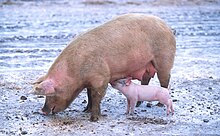porcus
Appearance
Latin
[edit]
Etymology
[edit]From Proto-Italic *porkos, from Proto-Indo-European *pórḱos (“young pig”). Cognate with Old English fearh (“piglet”).[1] More at farrow. Compare also Ancient Greek πόρκος (pórkos).
Pronunciation
[edit]- (Classical Latin) IPA(key): /ˈpor.kus/, [ˈpɔrkʊs̠]
- (modern Italianate Ecclesiastical) IPA(key): /ˈpor.kus/, [ˈpɔrkus]
Noun
[edit]porcus m (genitive porcī); second declension
- a piglet, a young pig
- (more generally) a pig, hog
- Short for porcus marīnus (“sea-hog, mereswine, porpoise”).
- (derogatory) glutton, pig
- female genitalia
Usage notes
[edit]- For the semantic shift of “pig” to “female genitalia”, compare the same Ancient Greek use of χοῖρος (khoîros).
Declension
[edit]Second-declension noun.
| singular | plural | |
|---|---|---|
| nominative | porcus | porcī |
| genitive | porcī | porcōrum |
| dative | porcō | porcīs |
| accusative | porcum | porcōs |
| ablative | porcō | porcīs |
| vocative | porce | porcī |
Synonyms
[edit]- (pig): sūs
Hyponyms
[edit]- scrōfa (sow; female pig)
Derived terms
[edit]- caput porcī (“a wedge-shaped battle formation”)
- porca
- porcārius
- porcaster
- porcella
- porcellīnus
- porcelliō
- porcellus
- porcetra
- *porcīle
- porcilia
- porciliāris
- porcīnārium
- porcīnārius
- porcīnus
- *porcopiscis (“pig-fish, porpoise”) (Vulgar Latin)
- porcula
- porculātiō
- porculātor
- porculus
- porcus marīnus (“sea-hog, mereswine, porpoise”)
- subulcus
Descendants
[edit]- Balkan Romance:
- Dalmatian:
- Insular Romance:
- Italo-Romance:
- North Italian:
- Emilian: pôrch, pōrc
- Ligurian: pòrco
- Friulian: porc ⇒ purcit
- Piedmontese: pors, peurc ⇒ porcòt, porchèt
- Romansch: portg, piertg (Sursilan, Sutsilvan), püerch (Puter, Vallader), piertg, portg (Rumantsch Grischun, Surmiran), püerch (Puter, Vallader)
- → Alemannic German: Porgge (presumably)
- Venetan: porco
- Gallo-Romance:
- Ibero-Romance:
References
[edit]- ^ De Vaan, Michiel (2008) “porcus”, in Etymological Dictionary of Latin and the other Italic Languages (Leiden Indo-European Etymological Dictionary Series; 7), Leiden, Boston: Brill, →ISBN, page 481
Further reading
[edit]- “porcus”, in Charlton T. Lewis and Charles Short (1879) A Latin Dictionary, Oxford: Clarendon Press
- “porcus”, in Charlton T. Lewis (1891) An Elementary Latin Dictionary, New York: Harper & Brothers
- porcus in Charles du Fresne du Cange’s Glossarium Mediæ et Infimæ Latinitatis (augmented edition with additions by D. P. Carpenterius, Adelungius and others, edited by Léopold Favre, 1883–1887)
- porcus in Gaffiot, Félix (1934) Dictionnaire illustré latin-français, Hachette.
Anagrams
[edit]Categories:
- Latin terms inherited from Proto-Italic
- Latin terms derived from Proto-Italic
- Latin terms inherited from Proto-Indo-European
- Latin terms derived from Proto-Indo-European
- Latin 2-syllable words
- Latin terms with IPA pronunciation
- Latin lemmas
- Latin nouns
- Latin second declension nouns
- Latin masculine nouns in the second declension
- Latin masculine nouns
- la:Livestock
- la:Male animals
- Latin short forms
- Latin derogatory terms
- la:Pigs

